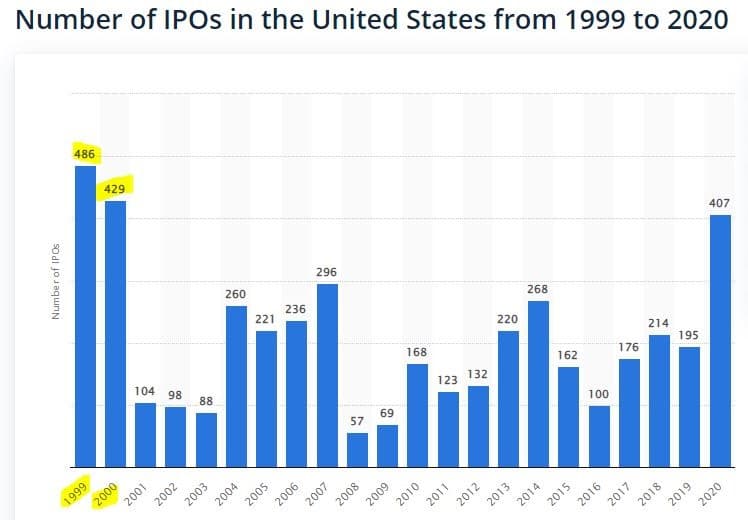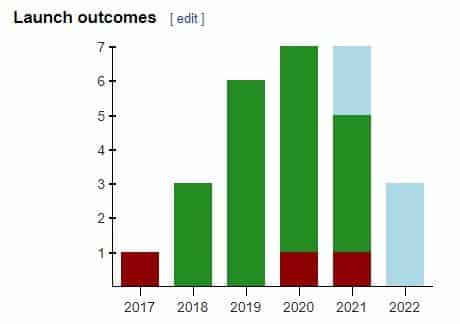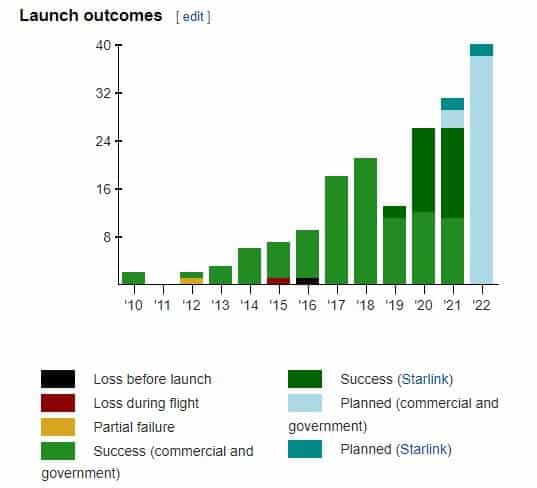Why We’re Avoiding Rocket Lab Stock – RKLB

The number of companies going public is becoming overwhelming. We largely cover U.S. initial public offerings, and 30% of them this year (measured by proceeds) have been special purpose acquisition companies (SPACs). But here’s the really interesting metric. If the data provided by StockAnalysis.com is to be believed, there have been 991 IPOs on the US stock market in 2021. We only add that disclaimer because there are so many different numbers floating around. Here’s a chart from Statista showing the number of IPOs over the last 21 years:

If that data is to be believed, that means there have been more IPOs this year than in both years of peak dot-bomb times. We’re spoiled for choice when it comes to new positions for our current portfolio of (checks brokerage account) 34 tech stocks. We’re close to our proposed limit of 36 stocks, so we need to very carefully consider any potential additions. One theme we haven’t placed any chips on is the space industry.
A Dozen Space SPACs
In addition to OG satellite and spacecraft companies, retail investors now have a dozen space stocks to choose from that have all begun trading on the public market in a very short period of time. Using our nifty disruptive tech stock catalog, we can very quickly see how space SPACs have fared so far. (Company names link to latest research.)
| Space Travel / Tourism | Virgin Galactic | 16.27 |
| Rockets | Rocket Lab | 15.72 |
| Rockets | Astra Space | 11.10 |
| Satellites | AST SpaceMobile | 10.40 |
| Geospatial Intelligence | Planet | 10.38 |
| Space – General | Virgin Orbit | 10.29 |
| Geospatial Intelligence | Satellogic | 9.96 |
| Space – General | Redwire | 9.11 |
| Geospatial Intelligence | BlackSky Holdings | 8.47 |
| Space – General | Momentus | 7.22 |
| Geospatial Intelligence | Spire Global | 4.57 |
Since all SPACs are initially priced at $10 a share, you can very quickly see relative performance. Confusing short-term price appreciation with the quality of the underlying business is a rookie move, but these tables are always fun to look at. We can also use this data to stroke the frail egos of our underpaid research team.
Risk-hungry investors always want to hear about stock picks that generate alpha, but equally important are the stocks you don’t invest in that end up hitting the skids. Since we warned about Momentus, their CEO has been indicted by the Feds and shares have fallen -38%. After we dumped Spire because we have a thing for Planet, shares fell -54%. With Planet being the clear leader in earth observation, why would an investor consider companies playing second fiddle?
Of the SPACs in this list, the only space company we might really want a piece of – at least once the reverse merger completes – is Planet. But there are also several companies we’d like to take a closer look at now that the SPAC mergers are done and dusted. One of those is Rocket Lab (RKLB) which is developing a launch service focused on small satellites.
Rocket Lab Stock Rockets
This past March we published a piece titled Rocket Lab Stock Offers Pure-Play on Rockets. Here’s how we left things:
We’re on the sidelines until Rocket Labs files some proper documents with the SEC that better define the risks we’re taking by going long this space stock.
Credit: Nanalyze
Rocket Lab has now filed some proper regulatory documents for us to peruse, so we need to decide if we want to hold the stock or not. The type of business we’re investing in with Rocket Lab is a company that builds rockets, then launches them into space with payloads other people have paid for. The leader in this space right now is SpaceX, and that’s the first point of contention. If space launches are to become a commodity, do we really want to invest in anyone but the leader? The company that pulls ahead will quickly achieve economies of scale which will drive down cost.
On the other hand, many companies and government entities aren’t happy when there’s a sole provider of something important like rocket launches. There is room for more than one player, and we know of at least eight companies developing reusable rockets. Of those, the company that seems closest to SpaceX, at least when it comes to small rocket launches, is Rocket Lab. But where Rocket Lab seems to be running afoul lately is being able to launch rockets that don’t blow up.
Rocket Lab Launches
In order to become a leader in launching payloads to space, you need to be launching lots of rockets. According to Rocket Lab’s website, the company has had 22 total launches with three failures. This chart from Wikipedia shows when these failures took place, the last happening in May 2021.

A success rate of 86.4% is rather dismal. While failures can be expected when a company’s launch services are just getting off the ground, they shouldn’t persist. We can see how SpaceX had a higher prevalence of failures early on which corrected over time.

Today, SpaceX has a success rate of 97.74% – 132 launches and one rocket that blew up before launch.
An article by TechCrunch last year talks about how SpaceX offers a “rideshare” program which allows small satellite companies to launch things into space without having to purchase an entire payload. The reduction in price was met by remarks from Rocket Lab that “at Rocket Lab smallsat customers are our number one business, and that’s what we do.” The plan is to further build out their offering to better service smallsat customers.
Rocket Lab Acquisitions
Planetary Space Corporation (PSC) is the latest addition to the Space Systems portfolio after recent acquisitions of Advanced Solutions, Inc (ASI) in October 2021, and Sinclair Interplanetary in April 2020. Here’s what each company does.
- PSC – leading provider of mechanical separation systems and satellite dispensers
- ASI – flight-proven off-the-shelf spacecraft flight software
- Sinclair Interplanetary – manufacturer of satellite hardware
Once PSC’s financials are reflected in Rocket Lab’s financials, we’ll have a better picture of the breakdown between the launch services and space systems segments. Concerns still remain around the gap in technological competence between SpaceX and Rocket Lab. Being able to land a rocket on a small platform in the ocean is an incredible accomplishment while Rocket Lab recovered the booster from its Electron launcher for the third time several weeks ago. From TechCrunch:
Rocket Lab is also a step closer to executing its ultimate reusability plan: using a parachute to slow the velocity of the booster and capturing it midair with a helicopter.
Credit: TechCrunch
Sounds a bit archaic when you consider SpaceX is now working on a fully reusable rocket. Falcon 9, SpaceX’s current partially reusable rocket, sheds its upper stage on each mission, the equivalent of a jet airplane, according to an article by Business Insider which says that would bring the launch price down to 1% of an expendable rocket. That is, if the company doesn’t go bust trying to do it. Just hours ago, media reports have been surfacing that SpaceX is on the “verge of bankruptcy” according to a leaked email from His Holiness Elon Musk. Pundits have been pointing out that he is said to have used similar scare tactics when building Tesla as well. If Starlink is indeed a trillion-dollar opportunity, there’s no way Mr. Musk would let SpaceX sink.
Should You Buy RKLB Stock?
We don’t give financial advice but we can give you tips on how to preserve capital. Any time you’re at an ATM in a shady part of town, always pull cash out discreetly and tuck it into your palm, hiding it from sight. Then, gesture angrily at the machine. Rip that receipt out of there and stare at it for about 10 seconds while dropping f-bombs. Any criminals watching you will think you didn’t get any cash and you’ll be robbed a lot less exiting ATMs. Openly stuffing a wad of cash into your wallet is asking for it.
So, about Rocket Lab stock. One approach could be to invest in Rocket Lab until the opportunity arises to invest in the leader, SpaceX. (If such an opportunity ever arises, that is.) We’re not in a hurry to invest in the particularly risky space domain, so we’d like to wait and see how 2021 pans out and what those acquisitions look like when the financials are rolled up. Using the lower end of Rocket Lab’s 2021 guidance, here’s what our simple calculation ratio works out to be;
- Market capitalization / annualized revenues
$6,945 million / $57.76 = 120
That’s an extremely high valuation, and we won’t touch any stock over 40, no matter how great the story is. To put that number into perspective, Rocket Lab shares would need to trade at $5.14 before we’d consider buying them based on 2021 revenues. Smart investors don’t buy into hype, and there appears to be plenty of that right now.
The Rocket Lab SPAC deck estimated $69 million for 2021, but we all know why that didn’t happen. Yes little Johnny, you’re right, it was The Rona. Rocket Lab only expects $14 million in Q4-2022 from the launch services segment with only two launches taking place during that time. Space Systems revenues will be between $9 million to $11 million with ASI acquisition included but not PSC. The Q3-2021 update is put together very well and it’s great to see the communication improve now that they’ve put that SPAC merger behind them.
Conclusion
Shooting giant containers of fuel into the sky and hoping they don’t blow up is a risky business. Entire books have been written about what went wrong at NASA when the Challenger space shuttle blew up. (They make you read these horribly boring stories in bee school.) When you understand how complex this industry is, you’ll quickly wonder how it’s even possible to achieve a near-perfect error rate.
We like that Rocket Lab is diversifying their business but have concerns around their launch cadence, launch vehicle failures, and excessively overvalued shares. We’re avoiding the stock until these metrics improve, especially the last one.






